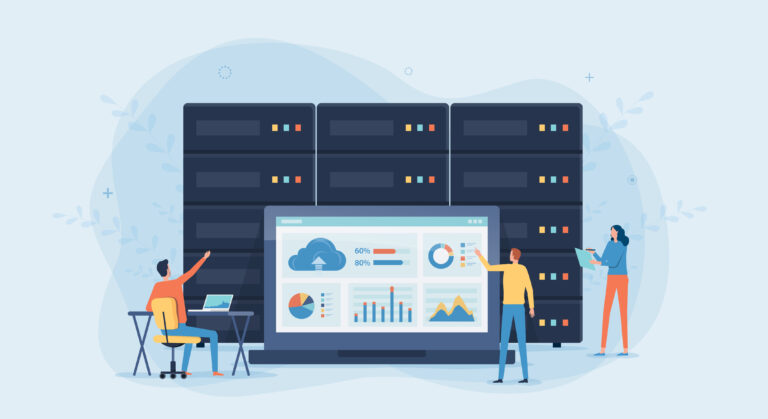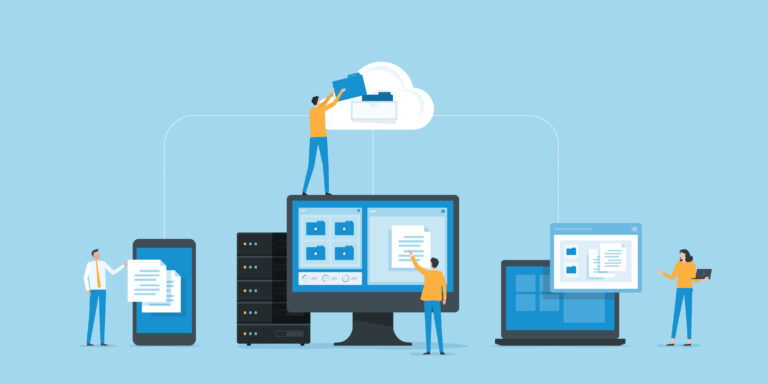A server is a computer program or device that provides services, resources, data, or programs to other computers and devices. Servers can come in two different forms, in-house or cloud-based. In-house servers are physical devices that can be used to store data that can be kept at your location in a dedicated space. Cloud-based servers serve the same purpose but do not operate using an on-site device. Instead, they are housed in a cloud computing environment and can be accessed remotely. To use a cloud server, server space is purchased from a provider that will store your data. Both servers can be used to accomplish the same goals, but in-house servers are housed at your company’s location and cloud-based servers are housed elsewhere.
Both types of servers have their pros and cons:

Pros of In-House Servers
Some businesses prefer in-house servers because they can keep their critical data strictly under their physical control. Since it is at their location, they have complete access to it at any time and can make customizations that they wouldn’t be able to if their server was provided by a third-party vendor. Maintenance and upgrades are also under their control since they have physical access to the hardware. Also, on-site servers don’t require an internet connection to function, meaning you will still be able to access your server if your internet goes down. Additionally, though in-house servers have more upfront costs, they do not require a monthly subscription fee like cloud-based servers do. And sometimes, with particularly large, graphics intensive files or database files, for example, the cloud just is not a good solution and an in-house server is the way to go to avoid significant latency.
Cons of In-House Servers
One of the biggest downsides of in-house servers is the upfront costs. Purchasing a server plus any necessary network accessories and programs can come with a hefty price tag, making it unrealistic to many small business owners at first. Also, having a physical in-house server means that you are solely responsible for keeping it up and running, keeping it up-to-date, keeping it protected from cyberthreats, etc. Physical devices can also be limited in storage space, requiring the purchase of more hardware, and lost or damaged data can be more difficult to restore if proper back-up measures have not been put in place. Lastly, in-house servers need a dedicated space to live on-site and sometimes are too big or inconvenient for businesses to store.

Pros of Cloud-Based Servers
Some businesses like cloud-based servers rather than in-house servers because they do not require huge upfront costs and can often easily expand storage space as your business grows. Cloud servers have also shown that they can quickly and easily recover data in the event of a disaster. Since these servers are hosted by a third-party provider, businesses are not responsible for maintenance and upgrades, and the servers are often more securely protected from cyberthreats. Additionally, with a cloud-based server, you don’t need to make space in your location to store hardware, or pay for the electricity to run it.
Cons of Cloud-Based Servers
One of the biggest downsides of cloud-based servers are the ongoing costs. Though they do not require much upfront, they require monthly fees, whereas an in-house server will only be purchased once. Also, your prices might increase as your business grows and you need more storage space. The more storage you need, the higher your monthly costs will be. Also, unlike in-house servers, cloud-based servers need an internet connection to function, so if your internet goes down, you will not be able to access your server. Lastly, some people do not like cloud-based servers due to the lack of control you have over them. A third-party provider will have access to your server, which makes some business owners uncomfortable. And as mentioned above, large files and database files may not work well in this environment, so it’s not a good option to consider for those.
Not so long ago, nearly everyone was wary of the idea of maintaining their private data securely in the cloud or had no idea what the cloud was even. Things have shifted and the idea of using the cloud has greatly increased, but that is often driven by the notion that it will save money since a server doesn’t have to be purchased. When the cost of storage and bandwidth is determined, though, it is sometimes more expensive to move to the cloud. It takes some calculating to determine which is the better option for each company.
The correct server application, use and location will likely differ for your company as compared to the next. Consulting with an IT professional will be of great benefit.
Read our previous post here: The Batteries of the Future
